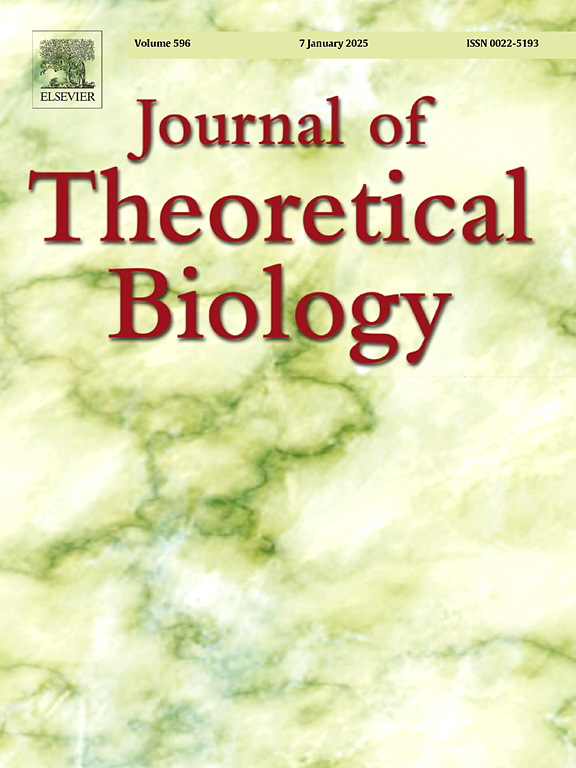Positive and negative selective assortment
IF 2
4区 数学
Q2 BIOLOGY
引用次数: 0
Abstract
In populations subject to evolutionary processes, the assortment of players with different genes or strategies can have a large impact on players’ payoffs and on the expected evolution of each strategy in the population. Here we consider assortment generated by a process of partner choice known as selective assortment. Under selective assortment, players looking for a mate can observe the strategies of a sample of potential mates or co-players, and select one of them to interact with. This selection mechanism can generate positive assortment (preference for players using the same strategy), or negative assortment (preference for players using a different strategy). We study the impact of selective assortment in the evolution and in the equilibria of a population, providing results for different games under different evolutionary dynamics (including the replicator dynamics).
正面和负面选择性分类
在受进化过程影响的群体中,具有不同基因或策略的参与者的组合可能会对参与者的收益和群体中每种策略的预期进化产生重大影响。在这里,我们考虑由被称为选择性分类的伙伴选择过程产生的分类。在选择性分类下,寻找伴侣的玩家可以观察潜在伴侣或合作玩家样本的策略,并从中选择一个进行互动。这种选择机制可以产生正面分类(玩家更倾向于使用相同的策略),也可以产生负面分类(玩家更倾向于使用不同的策略)。我们研究了选择配种对种群进化和均衡的影响,给出了不同进化动力学(包括复制因子动力学)下不同博弈的结果。
本文章由计算机程序翻译,如有差异,请以英文原文为准。
求助全文
约1分钟内获得全文
求助全文
来源期刊
CiteScore
4.20
自引率
5.00%
发文量
218
审稿时长
51 days
期刊介绍:
The Journal of Theoretical Biology is the leading forum for theoretical perspectives that give insight into biological processes. It covers a very wide range of topics and is of interest to biologists in many areas of research, including:
• Brain and Neuroscience
• Cancer Growth and Treatment
• Cell Biology
• Developmental Biology
• Ecology
• Evolution
• Immunology,
• Infectious and non-infectious Diseases,
• Mathematical, Computational, Biophysical and Statistical Modeling
• Microbiology, Molecular Biology, and Biochemistry
• Networks and Complex Systems
• Physiology
• Pharmacodynamics
• Animal Behavior and Game Theory
Acceptable papers are those that bear significant importance on the biology per se being presented, and not on the mathematical analysis. Papers that include some data or experimental material bearing on theory will be considered, including those that contain comparative study, statistical data analysis, mathematical proof, computer simulations, experiments, field observations, or even philosophical arguments, which are all methods to support or reject theoretical ideas. However, there should be a concerted effort to make papers intelligible to biologists in the chosen field.

 求助内容:
求助内容: 应助结果提醒方式:
应助结果提醒方式:


